
All categories
Featured selections
Trade Assurance
Buyer Central
Help Center
Get the app
Become a supplier

(300 products available)








































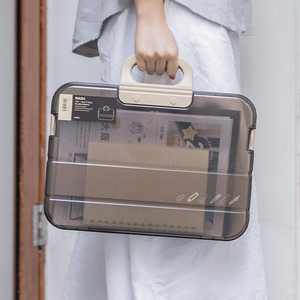
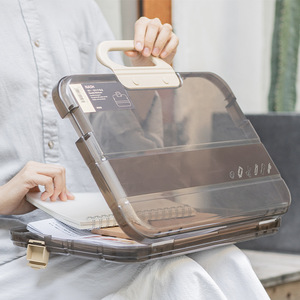
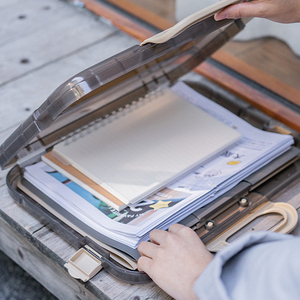
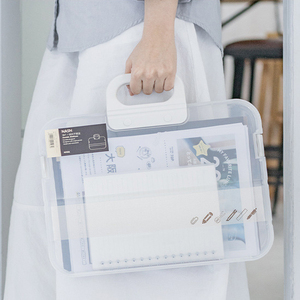
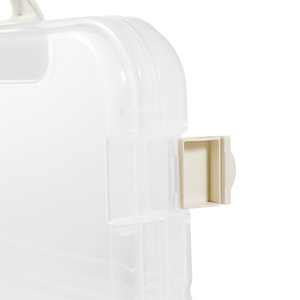
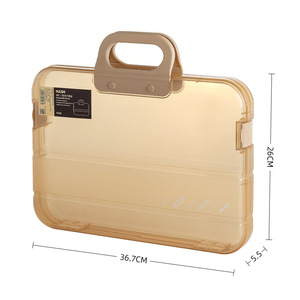
Transparent plastic document file boxes have a few different types. Here’s a breakdown of the various kinds available in bulk to help buyers in the filing supplies business cater to different customer needs.
An expanding transparent plastic document file box can hold multiple per file section. It has flexible, accordion-like sides for storage expansion as the files inside grow and contract. That makes these boxes ideal for holding files in the interim or when their numbers increase. Expanding boxes have several compartments; each one can carry a file’s worth of paperwork upright and organized. Even though the plastic used to make the box is transparent, the files inside may obstruct visibility and limit how far users can see inside the box. Expanding file boxes can be smaller but often are large enough to hold legal or A4 paper files.
Stackable file boxes enhance organization and systematization by making it possible to stack many empty, single-files boxes securely. Their construction allows safe storage of numerous boxes, but their design also allows for usage without the need for stacking. A sturdy file management solution that prevents toppling among stacked boxes is the core of its utility. Most boxes are made of clear plastic, enabling users to see file labels or contents without having to open each box. The smaller dimensions of some stackable boxes enable storage inside kitchen drawers or file cabinets or even on desktops. Larger boxes remain suitable for more files, with bigger boxes suitable for legal or A4 documents.
The latching storage box is an enclosed file box with a lid that clips on securely to snap the latches shut. It is very good at keeping documents, but with latches, it’s easy to open and close the lid when needed. This type of file box is suitable for long-term storage since it protects such papers from dust, spills, and more. Though some larger plastic toy storage boxes are lidded boxes for A4 files or smaller documents, there are also larger latching boxes for legal-sized documents.
Another type of transparent plastic document file box is the desktop organizers variant. These small boxes help organize files on top of the desk and eliminate the mess or clutter. They typically have several compartments that act as dividers for different document sizes or categories. As with other types of file boxes, the plastic is clear, so customers can see the contents of each compartment without the need to label it. This type of file box remains small enough to fit easily on a desk, but larger versions may also be available.
The functionality of clear file boxes is greatly improved by their design, which includes useful features that encourage file organization. Selecting the correct style entails evaluating elements such as size, closure methods, and interior arrangement. These design components not only increase usability but also improve the box's aesthetic appeal.
The volume of the clear file organization boxes varies quite a bit. Those for ordinary use around the office, such as desktop organizers, are small. Stacking or expanding file boxes may, however, be big enough to store many files, folders, or documents. For long-term storage, bigger boxes without expansion dimensions are needed. In such cases, a latch or an enclosing lid can seal the box tightly for safe storage of sensitive documents. Another important size consideration is the type of paper documents that will go into the box. The box size should ensure that papers do not get folded or crammed inside them. Standard file sizes include A4 and legal sizes. There are also boxes that can hold more than one file size. The box should be stackable or expand to fit more files as the collection grows.
Transparent file boxes have other closure options beyond the snap latches, including sliding lids and hinged covers. Those with sliding lids or hinged covers are more suitable for controlled access environments because they allow users to open or close the box quietly when necessary. Snap closures are typically used in such environments and are more easily closed. An adequately closing lid protects files from dust, spills, and interference. Ruled boxes' internal design consists of dividers. The internal sections of some boxes allow users to separate documents according to the category or type of document they belong to.
Clear file boxes are designed with ergonomic handles to ensure that users can pull the box out of storage or carry it easily and transport it to the office if need be. For stackable boxes, the box on top should have an appropriately designed base so that stability during the stacking doesn't compromise safety. Other features that enhance easy access to documents are labeled fronts of the box and clear internal spaces. Such enhancements go a long way in saving time and keeping things organized, especially in workplaces where the volume of documents tends to increase with time.
These clear file boxes have many uses in various environments. Document file boxes promote order and enhance efficiency, from corporate offices with many paperwork organizations to schools and homes. Below are a few examples of where these boxes can be used for organizing documents.
Clear file boxes help keep documents organized in any office environment. There are many ways to use them: file storage boxes can keep papers organized and neat, such as contracts, reports, and proposals. An organizing system reduces clutter on desks and work areas, thus enabling office workers to be more productive in their work. These boxes make the location of documents easier, thus avoiding time wastage that would occur when searching for papers. Desktop organizers help eliminate this clutter further by organizing papers on desks such that they are easily accessible for use.
Another scenario where these transparent storage boxes can be useful is in schools and other educational institutions. Students need these boxes for organizing papers, class materials, projects, and even supplies. Expanding file boxes prove handy in the interim because they help organize the documents so that when it is time to work on projects or assignments, the materials needed are at hand. These boxes assist teachers in organizing lesson plans and teaching materials and resources. Schools must have created a system that is affordable and easy to use so that all the documents required are organized.
Home-based work or study environments require the same level of organization as those experienced in the workplace or at school. The clear file boxes mentioned above are perfect for organizing such documents as bills, important papers, or any other type of document needing space-saving organization. It is even easier to be organized if the boxes can be kept in drawers or cabinets. An easy way to use and access these boxes is through a well-designed storage system based on document type or classification.
For keeping documents that are not in daily use, latching storage boxes are ideal. Legal or archival documents can be stored safely. They are great for keeping files such as tax returns, old contracts, or any documents a person or business may need in the future but isn’t using at the moment. The boxes are great when documents need to be stored for several years and kept safe from dust, moisture, and other elements. The documents can even be organized further by using color-coded labels or boxes.
It is very important to follow the specifications and care instructions to maintain the functionality of these clear plastic storage boxes for documents for a longer period. To maintain their usefulness, organizational boxes must be stored properly and cleaned. A file box typically consists of the following specifications and maintenance requirements.
Document file boxes are typically made of durable but lightweight materials such as polypropylene. This plastic's transparency enables file contents to be visible while adding the strength required for a storage container. Polypropylene is very good at resisting bending, breaking, or weathering even after long periods of use. Some boxes are made of polycarbonate plastic, which is more rigid and may be useful in situations where impact resistance is critical.
A crucial part of maintaining the file boxes is ensuring that they are cleaned and taken care of properly. Dust and fingerprints may accumulate on the plastic's surface, reducing visibility. Non-abrasive cloths must be used with warm soapy water or a mixture of vinegar and water to clean the storage box. It is, however, advised against using strong chemicals containing bleach because they weaken the plastic or may haze its transparency. The boxes should be dried and stored in the right place, away from direct sunlight, so their shapes and strength remain intact.
Plastic document holders come with different file capacity or weight such as expandable file boxes. These constraints must be observed if the box is to function effectively and not be damaged. Excessive weight causes the box to bend, break, or even lower during use, which can be hazardous since documents will not be organized properly. Piled files within a box should be arranged so as to attain an even distribution of weight. While stackable storage boxes can hold more items than, say, desktop organizers, proper stacking and weight distribution must be considered when using them.
When it comes to organizing documents in bulk, transparent file boxes make an excellent choice. Their versatility and functionality make file organization easy for businesses and individuals. Selecting the right types and designs, along with proper specifications and maintenance, enhances their usability.
These boxes serve various scenarios, from corporate offices to schools and long-term storage. By keeping documents organized and protected, transparent file boxes contribute to increased productivity and efficiency.
For those in the business of distributing these boxes, considering factors such as materials, size, and capacity can significantly impact customer satisfaction. Providing quality, durable, and aesthetically pleasing transparent file boxes for document storage can help conquer this vital market niche.
And so, to summarize, purchasing these boxes means investing in a practical and versatile solution for document storage and organization.
A. There are numerous sizes of these boxes, but there are also standard sizes of paper documents that fit the average size of these boxes: A4 and legal sizes. These storage boxes can also accommodate more than one paper size by using more than one file box size.
A. Excessive weight causes the box to bend or break. Such an impact on the box can also damage the files contained in it. To avoid this problem, the weight capacity of a box must be determined and followed when in use.
A. Yes, latching boxes are excellent containers for long-term document storage. They protect the documents from dust, moisture, and other elements.